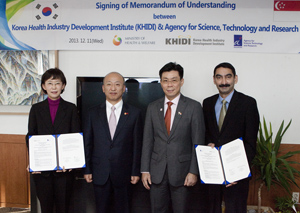
From left to right: Ko Kyung-Hwa, president of the Korea Health Industry Development Institute (KHIDI); Moon Hyung-Pyo, South Korea’s minister of health and welfare; Lee Yi Shyan, Singapore’s senior minister of state for trade and industry and national development; and Raj. Thampuran, managing director of A*STAR, at the signing of the Memorandum of Understanding between A*STAR and KHIDI.
© 2014 A*STAR
In a move that reflects the growing bilateral co-operation in science and technology between Singapore and South Korea, A*STAR and the Korea Health Industry Development Institute (KHIDI) have signed a Memorandum of Understanding (MoU) intended to strengthen biomedical research and innovation strategies in the two Asian nations.
Established in 1999 and funded by the national government, KHIDI is the primary organization dedicated to promoting and developing the health and biomedical industry in South Korea.
The official signing of the MoU was held at the South Korean Ministry of Health and Welfare in December 2013, during a three-day visit by Singapore Prime Minister Lee Hsien Loong to South Korea. Encompassing three core areas, the MoU’s objectives are to advance biomedical sciences and medical technologies, promote talent exchange and development and facilitate joint commercialization activities between both countries.
“The MoU aims to foster greater interaction between Singapore and South Korean researchers and companies to enhance regional and global competitiveness,” says Benjamin Seet, executive director of the A*STAR Biomedical Research Council.
Collaborative research activities are already underway, one of which is the newly established A*STAR–KHIDI Joint Research Fund. The US$5 million fund will award open innovation grants and is designed to encourage collaboration between public sector researchers in Singapore and biotechnology or medical device companies in South Korea, further strengthening links between the two countries. The first call for grants is expected to be launched in March 2014.
Among other collaborative initiatives being proposed is a KHIDI Biomedical Sciences Development Centre in Singapore. The center will enable the ‘matchmaking’ of South Korean biomedical small and medium enterprises (SMEs) with scientists and engineers in Singapore.
“We see these initiatives as a win–win for both organizations,” says Seet. “On the one hand, they align with A*STAR’s role in developing the biomedical industry by adding to the critical mass and pipeline of biotech and medical-technology companies performing research and development in Singapore. And from KHIDI’s perspective, they provide domestic South Korean companies with a platform on which to engage with the region, as well as to leverage on Singapore’s expertise to develop and commercialize their products.”
In the area of talent exchange and development, A*STAR will soon be welcoming students from South Korea’s Dongguk University. The first cohort will comprise 15 master’s students who will be part of the Singapore–Stanford Biodesign (SSB) Program. The highly competitive SSB program is designed to nurture the next generation of medical-technology innovators who will help to develop effective med-tech devices for Asia’s clinical needs.
A*STAR and KHIDI have also stepped up engagement activities over the past year, jointly hosting two workshops in August and November 2013. More than 260 participants attended, including delegates from 17 South Korean organizations and companies with interests that span the medical device, pharmaceutical and biotechnology sectors.
Through the signing of the MoU, South Korea joins Japan, China, Australia, New Zealand and a number of other countries that have entered into research collaboration agreements with Singapore. These partnerships serve to reinforce Singapore’s growing presence in the global biomedical research arena.



